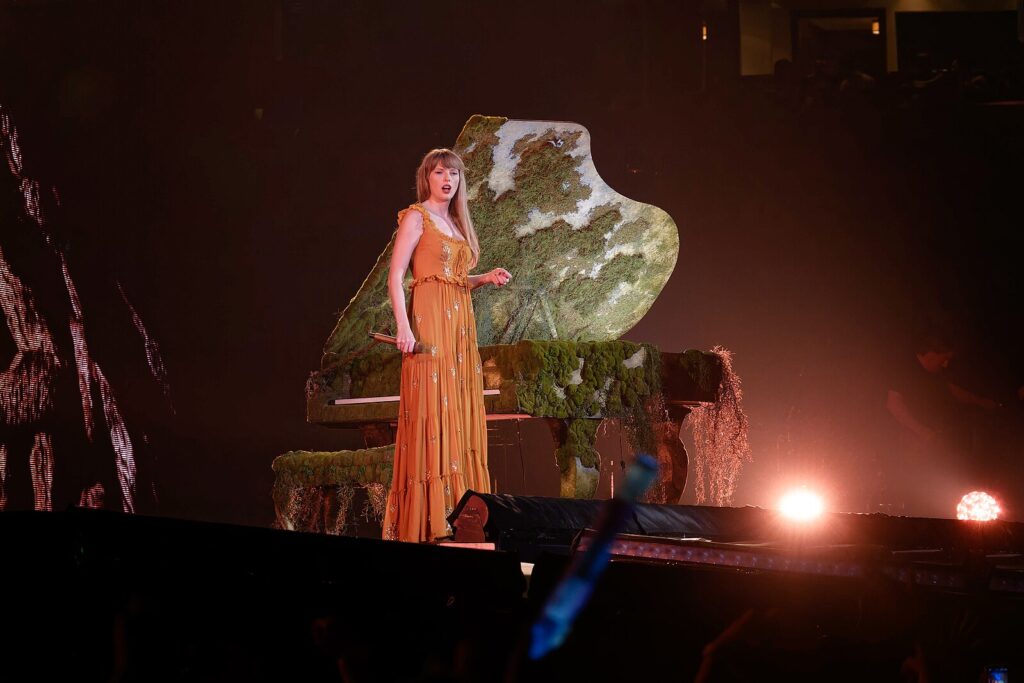The classical world continues to influence many facets of popular culture including social media trends, art, and music. References to classical figures and myths can even be found in the songs of the biggest names in the music industry, including Taylor Swift.
Taylor Swift, a teenage country singer turned cultural icon, has become a prolific figure in the media and in popular culture. Swift’s famous song writing skills have brought her to a level of success previously unseen in the music industry. During her record-breaking ‘The Eras Tour’, Swift brought her music to over 10.1 million people globally. ‘The Eras Tour’ became the first concert tour to gross over $1 billion and then over $2 billion.[1] Swift’s large fanbase, known as Swifties, pay keen attention to her life, work, and songs as they dissect her actions for meaning and references. Swift’s fans have been known to joke that to understand Swift’s music the average person requires a dictionary. Despite this, most of Swift’s appeal comes from her lyrical relatability. Throughout her career Swift has been most revered for her vulnerability and storytelling, capturing the experiences of modern women as they grow up navigating love, friendship, betrayal, and (most famously) heartbreak. Swift’s discography also showcases a love for drawing on literary and classical references, relating her modern experiences to those of classical figures, a facet of Swift’s work that can be found across many of her famous eras.

One of the things that has made Swift so prolific in recent years has been the rerecording and re-release of her first six albums.[2] These ‘Taylor’s Versions’ of the album include new tracks, from the vault, of songs which failed to make the original albums. Upon reclaiming her third studio album, ‘Speak Now’, Swift released the song ‘When Emma Falls in Love (Taylor’s Version)’. The lyrics describe a friend falling in love, and how it changes her and those who fall for her. In this song, Swift refers to Cleopatra, comparing the character of Emma to the Egyptian Queen. Swift repeatedly remarks that Emma is “Like if Cleopatra grew up in a small town”.[3] This song is a clear example of how Swift uses her audience’s prior knowledge of classical figures to build a connection to the lyrical narratives of her music. Swift likens the character of Emma to Cleopatra to convey to her listeners the beauty, power, and influence over men Emma holds, which Swift sings of with envy. Although not released until her album was re-recorded, based on when the song was actually written, this is one of the first classical references in Swift’s music. Further references to the classical world have subsequently appeared across multiple albums.
Despite Swift’s music famously revealing details of her personal relationships, many of her songs follow fictitious narratives. This is most diligently explored in Swift’s sister albums ‘folklore’ and ‘evermore’. Despite ‘evermore’ being considered the forgotten child of Swift’s discography, the album contains some of the songs which are most beloved by her fanbase, in particular ‘champagne problems’. The song describes a failed engagement in which Swift blames the failure upon herself, reflecting on her former partner positively. In the line “Your Midas touch on the Chevy door”,[4] Swift describes this former attachment through the classical myth of King Midas. Swift uses the myth to showcase the good in this former partner as they turned the mundane into gold, however, this trait also curses the relationship, as Swift is unable to live up to the goodness of her former partner. This song, a prominent fan favourite, became an important aspect of the Eras Tour, with fans forming the tradition of applauding Swift for minutes on end after the song ‘champagne problems’ was performed, often only stopping when Swift would move to continue her performance.

In the lyrics of her most recent album, ‘The Tortured Poets Department: The Anthology’, Swift makes two notable lyrical classical references. In the track ‘So High School’ Swift describes a relationship which makes her feel young again, stating in the song “You know how to ball, I know Aristotle.”[5] This line gained significant online interest due to its clear reference to her current partner, American Football player, Travis Kelce. Also sparking online trends in people who related to the line, this led many of her young audience members to inquire about who Aristotle was in order to have a greater understanding of Swift’s lyrics. Another track from the album ‘Cassandra’ contains Swift’s most significant classical reference in her discography. The song, as the title suggests, relates to the myth of Cassandra, who could see the future but was doomed never to be believed. In the song, Swift compares her own life to the mythical figure recalling times she was not believed. The lyrics reference key times of public turmoil in Swift’s life, notably her public feuds with record executive Scooter Braun and musician Kanye West. In the chorus Swift sings “So, they killed Cassandra first ’cause she feared the worst and tried to tell the town.”[6] In this work, Swift manipulates the myth to convey her frustrations at times when public discourse opposed her and at the lack of outrage on her behalf when the truth was revealed. ‘The Tortured Poets Department’, as the title suggests, is inspired by poets and is subsequently Swift’s most classically influenced album to date both lyrically and aesthetically.
Swift’s classical references are not confined to song lyrics. In the music video for the song ‘Karma’, featuring rapper Ice Spice from the album ‘Midnights (The Till Dawn Edition)’, Swift appears in the style of a classical statuette.[7] In the music video, Swift’s first appearance references Nemesis, the goddess of retribution. This depiction fits with the wider narrative of the song as Swift describes having a close relationship with karma which comes for those who have wronged her. Swift’s feuds have been a significant source of inspiration for her work, such as in the song ‘Cassandra’ which as previously described is inspired in part by classical myth. During the promotion of the album, ‘The Tortured Poets Department’, Swift in collaboration with Spotify created a pop-up installation at The Grove, a shopping mall in Los Angeles. The installation mimicked a library, and contained many of the ‘easter eggs’ or clues Swift famously leaves for dedicated fans.[8] Upon the shelves of the library were multiple busts in the classical style, including a replica of Diana of Versailles. As goddess of childbirth, the inclusion of Diana likely alludes to Swift’s references throughout the album to her struggle with the unfulfilled promises of a former relationship. For example, in ‘loml’ (love of my life or loss of my life) she sings of “Talking rings and talking cradles.”[9] As with everything Swift does, these inclusions sparked discourse amongst fans, triggered online trends and generated collaborative analysis in attempts to decode her intent.

Swift is just one of many artists who have made classical references in their work. However, her significant following sets the impact of such actions apart. As with every aspect of Swift’s life, her lyrics are dissected for meaning and what they reveal about scandals and relationships both past and present. Swift’s influence knows no bounds as she shapes people’s lives with her music and impacts whole economies with her tours.[10] Small actions taken, or lines written by Swift, have the power to start trends both within her fandom and beyond. As such a greatly influential force, Swift’s music could serve to spark interest in the classical world in her predominantly young female fanbase, helping a new generation to get to “know Aristotle.”[11]
Megan Rosevear is in her third year of a Bachelor of Arts, majoring in History, Political Science and International Relations. She is an avid Swiftie and was lucky enough to attend the Eras tour in 2024.
Footnotes
[1] Megan McCluskey, “A Look Back at Taylor Swift’s Record-Breaking Eras Tour,” Time, December 6, 2024, https://time.com/7199590/taylor-swift-eras-tour-final-numbers/.
[2] Taylor Swift announced on May 30, 2025, that she had bought back the right to the master recordings of her first six albums. At the time only four of the six albums had been re-recorded as ‘Taylor’s Versions’.
[3] “When Emma Falls in Love (Taylor’s Version),” track 18 on Taylor Swift, Speak Now (Taylor’s Version), Republic Records, 2023.
[4] “champagne problems,” track 2 on Taylor Swift, evermore, Republic Records, 2020.
[5] “So High School,” track 22 on Taylor Swift, The Tortured Poets Department: The Anthology, Republic Records, 2024.
[6] “Cassandra” track 27 on Taylor Swift, The Tortured Poets Department: The Anthology, Republic Records, 2024.
[7] Taylor Swift, “Karma (Official Music Video) ft. Ice Spice,” posted May 26, 2023, by Taylor Swift, YouTube, 3 min., 25 sec., https://www.youtube.com/watch?v=XzOvgu3GPwY.
[8] “Taylor Swift’s ‘THE TORTURED POETS DEPARTMENT’ Breaks Multiple Spotify Records in Less Than 24 Hours,” Spotify, accessed March 9, 2025, https://newsroom.spotify.com/2024-04-19/tortured-poets-department-taylor-swift-library-los-angeles/.
[9] “loml,” track 12 on Taylor Swift, The Tortured Poets Department: The Anthology, Republic Records, 2024.
[10] Jeannie Kopstein and Mariah Espada, “The Staggering Economic Impact of Taylor Swift’s Eras Tour,” Time, August 24, 2023, https://time.com/6307420/taylor-swift-eras-tour-money-economy/.
[11] “So High School,” track 22 on Taylor Swift, The Tortured Poets Department: The Anthology, Republic Records, 2024.